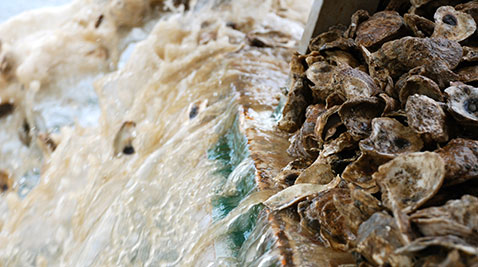
House Bill 118, which would form the task force and charge it to make recommendations by Jan. 1, 2015, passed with bipartisan support on Monday, the final day of the 2014 session. The state Department of Natural Resources would be required to provide staff to assist the task force.
Gov. Martin O’Malley has not indicated whether he will sign the legislation, a spokesman said.
The bill passed unanimously in the Senate, and the House of Delegates passed it 104-32. Delegate Eric Luedtke, D-Montgomery, the bill’s sponsor, said some House Republicans opposed the bill because it relates to climate change, which scientists have tied to increases in acid levels in global waters.
As more carbon dioxide is released into the air, more is also absorbed into global waters, leading the water to become more acidic. This could make it more difficult for sea life, including oysters, to grow.
Luedtke hopes the task force will allow the state to begin developing policies to address potential issues related to acidification.
“The state’s been putting millions into oyster restoration, so it doesn’t make sense to do that and not look into this issue,” Luedtke said. “We need to start figuring out how we can best help watermen adapt.”
Some watermen said they were skeptical that the task force would help stave off acidification in the bay.
“There’s nothing a group of politicians comes up with that’s going to end up helping us out. That’s just the way it goes,” Tim Devine, owner of Barren Island Oysters in Hoopers Island, said in February. “By the time it gets agreed upon, it doesn’t do anything.”
The task force would be comprised of a senator appointed by the president of the Senate; a delegate appointed by the Speaker of the House; the secretary of natural resources; the secretary of the environment; and representatives of the state’s aquaculture industry, the Maryland Watermen’s Association, the National Aquarium in Baltimore, the University of Maryland Center for Environmental Science, and the Chesapeake Bay Foundation, all of which would be appointed by Gov. Martin O’Malley.
Rich Norling, legislative director for DNR, said he expected that O’Malley will sign the legislation creating the task force. A spokesman for O’Malley said the governor’s office does not announce what bills he will sign before he does so.
Norling said he expected Sen. Bill Ferguson, D-Baltimore City, to be appointed because he volunteered for the task force along with Luedtke, the bill’s sponsor.
The department’s Resource Assessment Service is interested in working with the task force because it has data related to acidity in the bay, Norling said, and the department’s Fisheries Service is also interested in contributing because it is concerned about potential impacts to oysters.
Washington state appointed a council in 2013 similar to Maryland’s task force to evaluate acidification in Puget Sound, near Seattle, Norling said.


You must be logged in to post a comment.